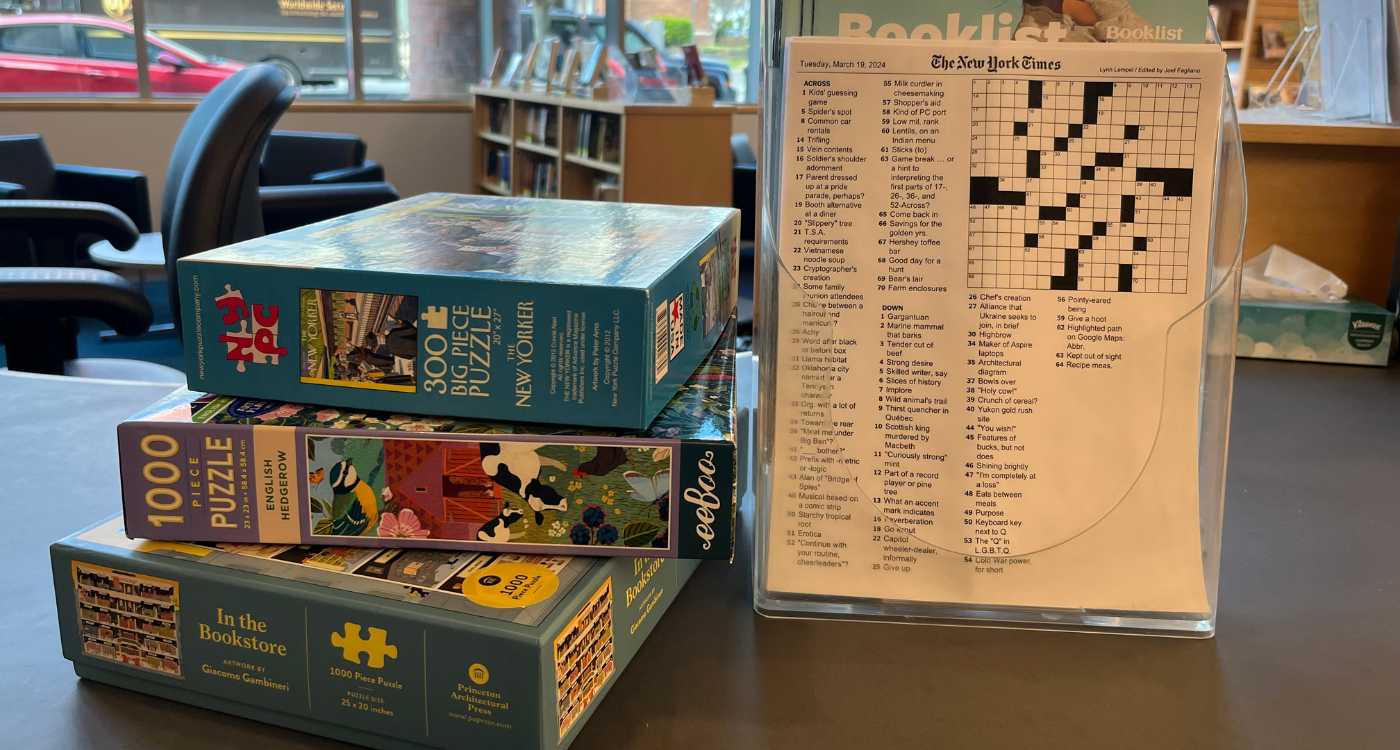
National Puzzle Day was Jan. 29, and we celebrated with a jigsaw puzzle tournament and take-away puzzle packets. Truly, every day at Princeton Public Library seems like a celebration of puzzles based on how popular two features of our first floor are: the jigsaw puzzle table and the daily crossword. Some people pop in every day to grab the current crossword puzzle, while others catch up in bursts. Some prefer the beginning-of-the-week challenges (“I can only do the easy ones!”), while others tackle the more complex Thursday, Friday and Saturday puzzles (“My child/spouse/friends and I do these together every week!”).
Our jigsaw puzzle table is occupied throughout the day, and we love seeing the wide range of ages represented there. Pairs or groups come in to work together, while others work in companionable silence with strangers. We also have a fairly robust jigsaw puzzle exchange that we encourage you to take advantage of! If your love of puzzles runs deep, you may be interested in reading more about their backgrounds and the people who make and love them.
The Riddles of the Sphinx: Inheriting the Feminist History of the Crossword Puzzle by Anna Shechtman. Shechtman, who published her first New York Times crossword puzzle at age 19 and went on to lead The New Yorker’s crossword section, explores the often hidden role of women in the field of puzzles and shares her own experiences in the “CrossWorld.”
Thinking Inside the Box: Adventures With Crosswords and the Puzzling People Who Can’t Live Without Them by Adrienne Raphel. Raphel dives into the history of the crossword and into the present company of elite solvers, enthusiasts aboard a crossword-themed cruise, and the “puzzle master” himself, New York Times crossword editor Will Shortz.
The Puzzler: One Man’s Quest to Solve the Most Baffling Puzzles Ever, From Crosswords to Jigsaws to the Meaning of Life by A. J. Jacobs. Jacobs, a self-described “human guinea pig,” loves to put himself through a social experiment and then write about it. This time, he tackles the wide range of puzzles, from anagrams to “Where’s Waldo?,” in an analysis of what makes puzzles so special and why we love them. You’ll also find a section of original puzzles to solve.
Fun by Paolo Bacilieri. For the more visually inclined, Bacilieri has created a combination graphic novel and graphic history of puzzle makers and solvers over the past century, considering the various ways puzzles have been, or could be, used.
The Pattern in the Carpet: a Personal History With Jigsaws by Margaret Drabble. Weaving memoir and history together, Drabble shares her love of jigsaw puzzles and the role they have played in the lives of her family and throughout history. If you were one of the many who turned to jigsaw puzzles during the pandemic, you’ll find a kindred spirit here.
Eager for more? Check out our discussion with mathematician and logic-puzzle enthusiast Jason Rosenhouse, author of Games for Your Mind: the History and Future of Logic Puzzles. If five books aren’t enough, you can find puzzle-themed cozy mysteries, books on Scrabble and other board games, and more in our physical and digital collections. Take a look through our catalog, or let us know if we can make a suggestion.
Photo courtesy of the library.
